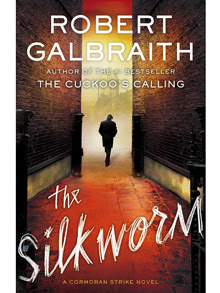We are starting today with a review of The Silkworm. At the time this it was published, John Granger called it the best book Rowling had ever written. I'm curious how many of you agreed.
I'm going to start with the opening scene and some questions about the character we meet there: Dominic Culpepper. He is interesting to me for an number of reasons. First, he seems a bit too chummy with Strike to be just another client, even for a repeat one. Thus, I have always assumed he was an old friend of Strikes, from his pre-detective days. But, unlike Shanker, Anstis, Dave Polworth, Nick Herbert, etc. we've never been told how or when Strike made his acquaintance.
Second, he appears to be from a wealthy, or at least upper-class family; as the Chiswells showed us, the two are not necessarily synonymous. But he is described as a "public school" boy, and we know his cousin Nina has an "Honorable" title.
This, at least to an American mind, makes his choice of profession interesting. I am not accustomed to thinking of "tabloid journalist" as being a particularly "upper-class" sort of profession. Certainly in the US, those types of papers have a definite taint of sleaziness. The fact that News of the World would be forced out of business within a couple of years for illegal phone hacking, a topic Strike raises with Culpepper, suggests they are not entirely respectable.
So, assuming Culpepper is, indeed, an old friend of Strike's, where might they have become acquainted? Oxford seems the most likely possibility, but we are also told that Leda had twice enrolled Strike in expensive private schools, only to pull him out after a few terms. We know, of course, that the first time was the prep school where Strike met Charlie Bristow. Could Culpepper be an old friend from the second school?
Moving on: I love the introduction of Leonora Quine and the reversal of the opening of The Cuckoo's Calling. Before, Strike was destitute and almost without work, seeming almost dumbfounded when John Bristow shows up as an actual client. Now, he's doing well enough to ditch a well-paying client and take on a charity case. And I love the "single step" Strike takes towards the guy to run him out of the office when he calls Leonora a stupid woman. We'll see almost identical posturing when Strike runs Saul Morris out of the office in Troubled Blood.
Overall, I like the way the book is fairly quick about introducing you to all the suspects, with the interviews with Christian Fisher, Liz Tassel and Kathryn Kent, then followed by the Roper Chard party where we meed everyone else. Re-reading the part about Liz's Doberman once biting Owen, knowing the dog has just eaten and thrown up part of Owen's intestines makes me feel a bit squeamish. A bit of trivia: The Roper Chard party happened on the night the first Deathly Hallows movie premiered.
The only significant non-case interlude is drinks with Matthew, where we learn that Strike's judgement og thre guy is right on the money. Please also note that Robin is freely attaching kisses to texts, making her worry about that later in Troubled Blood a bit far-fetched.
Meeting Nina Lacelles reminded me how much I liked her at the beginning; she seemed very eager to help Strike and took a big risk by copying the manuscript for him.
More to come on Thursday, including poor Marguerite!

There’s a cute part where Strike learns Robins birthday has passed and she says Don’t worry, I wasn’t sitting here all day waiting for you to bring me flowers. I just love how what’s innocuous upon first read becomes more layered with information from subsequent books.
ReplyDeleteIn this section I think we hear the beginning of the beginning of the end to Robin and Matthew. In addition to the fight they have over Robin giving Strike a wedding invitation without conferring with Matthew (the first time Robin lies to him when she tells him she thought they already talked about it) after drinks with Matthew and Strike she thinks “Never before had she known Matthew quite like that. Or at least never before had she SEEN him like that.” She starts to look at him through a more critical lens, I think partially because she has an example in Strike of so many things she admires to contrast him to.
ReplyDeleteI think by Troubled Blood Robin was single and the kisses on the texts might give a different interpretation xD xxxxxx
ReplyDelete